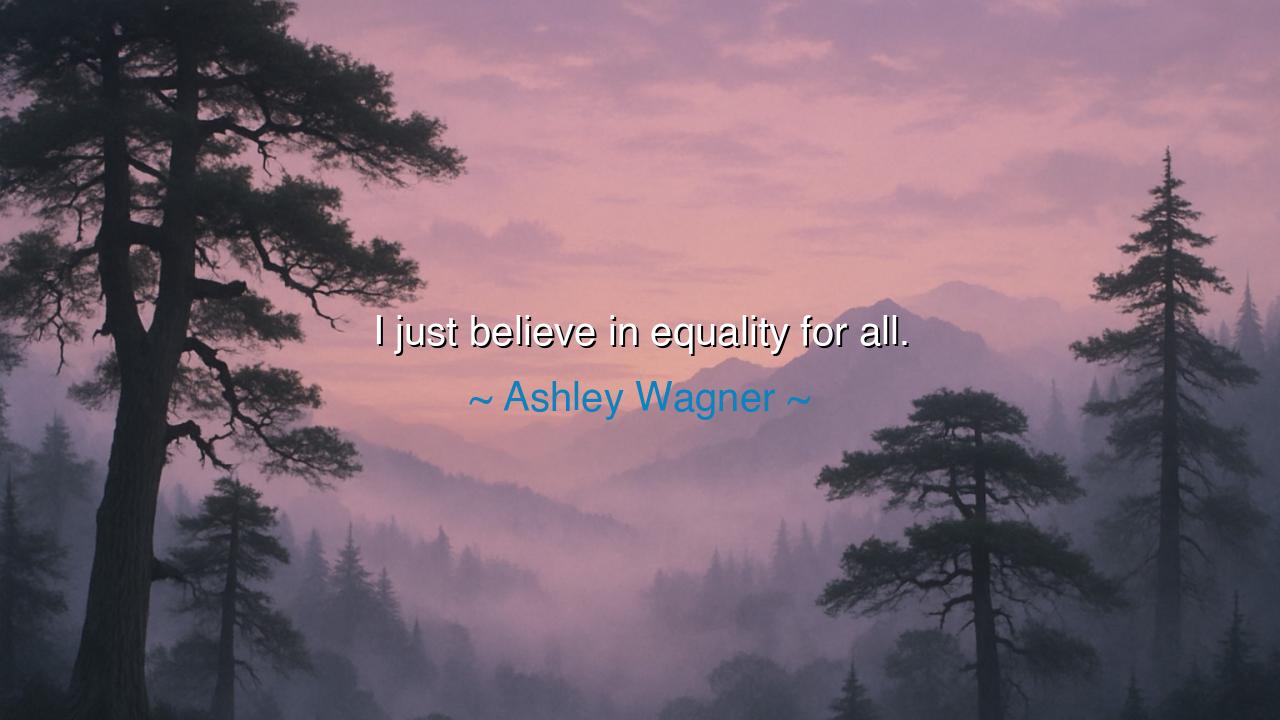
I just believe in equality for all.






Hear now, O seekers of truth and bearers of conscience, the words of Ashley Wagner, the athlete whose grace upon the ice mirrors the grace of her heart: “I just believe in equality for all.” So simple are these words, and yet within their simplicity lies a power greater than any throne or empire. For they speak of the oldest dream and the highest calling — that all who walk the earth, regardless of birth or form or creed, are equal in dignity, and that no measure of power or privilege can make one soul more worthy than another.
The meaning of Wagner’s declaration is both universal and eternal. To “believe in equality for all” is to see the divine spark shining in every human being, to refuse the blindness of prejudice and the arrogance of superiority. It is to affirm that humanity is one tapestry, woven from many threads — different in color, yet bound together by the same divine hand. Her words are not the cry of rebellion, but the whisper of truth that every conscience already knows: that justice, kindness, and respect are not selective gifts, but sacred rights.
The origin of Wagner’s conviction can be traced not only to her time but to the great movements of the human heart throughout history. As an athlete, she has lived in a world where competition is fierce but unity is essential — where the artistry of one is lifted by the respect of all. And as a public figure, she has seen the divisions of her age: the struggles for LGBTQ+ rights, the calls for racial equality, the voices of the marginalized demanding to be heard. From this understanding springs her simple creed: that equality is not a privilege granted by the powerful, but the birthright of every soul.
In the chronicles of humanity, there have always been those who lifted this banner before her. Consider the great Frederick Douglass, who once declared, “I would unite with anybody to do right and with nobody to do wrong.” Born in bondage, Douglass rose to prove that equality is not a matter of circumstance but of spirit. His voice thundered against the darkness of slavery, reminding a divided nation that liberty cannot belong to some — it must belong to all, or it belongs to none. His life, like Wagner’s words, was a testament to the indestructible truth that equality is not an ideal to be debated, but a law written in the very order of creation.
Yet, though centuries have passed and battles have been fought, the work of equality is never complete. Each generation must decide whether it will defend or deny the humanity of others. Wagner’s statement, in its purity, calls us back to the essence of that struggle — to remove the armor of indifference and stand naked in compassion. For to “believe in equality” is not merely to speak it, but to live it: to lift others when they fall, to listen when others are silenced, and to share space, opportunity, and dignity with all who dwell beneath the same sun.
The ancients, too, knew this truth. The Stoics taught that all men and women are children of the same divine fire, and that to harm another is to wound the self. The prophets of Israel spoke of justice rolling down like waters; the Buddha taught compassion for all sentient beings; and the Christ proclaimed that the meek and the merciful shall inherit the earth. Through all ages, in every language, the voice of equality has been the voice of the sacred — reminding humanity that we rise or fall together.
Therefore, O listeners, take this teaching into your hearts: to believe in equality for all is not a passive act, but a sacred duty. It requires vigilance, humility, and courage — the willingness to confront injustice wherever it hides, even within ourselves. Treat no person as lesser, and no life as expendable. Celebrate difference not as division but as divine variety. For only when every soul is honored will the world know peace; only when every voice is heard will the song of humanity be whole.
And so let the words of Ashley Wagner be carried forward, not as mere sentiment but as a vow: “I just believe in equality for all.” Let them echo through classrooms and courts, homes and hearts. Let them shape how we live, how we speak, and how we see one another. For when we practice this belief with conviction and compassion, we become what we were always meant to be — not tribes divided by fear, but one people bound by love, walking together toward the light of a more just and harmonious world.






AAdministratorAdministrator
Welcome, honored guests. Please leave a comment, we will respond soon